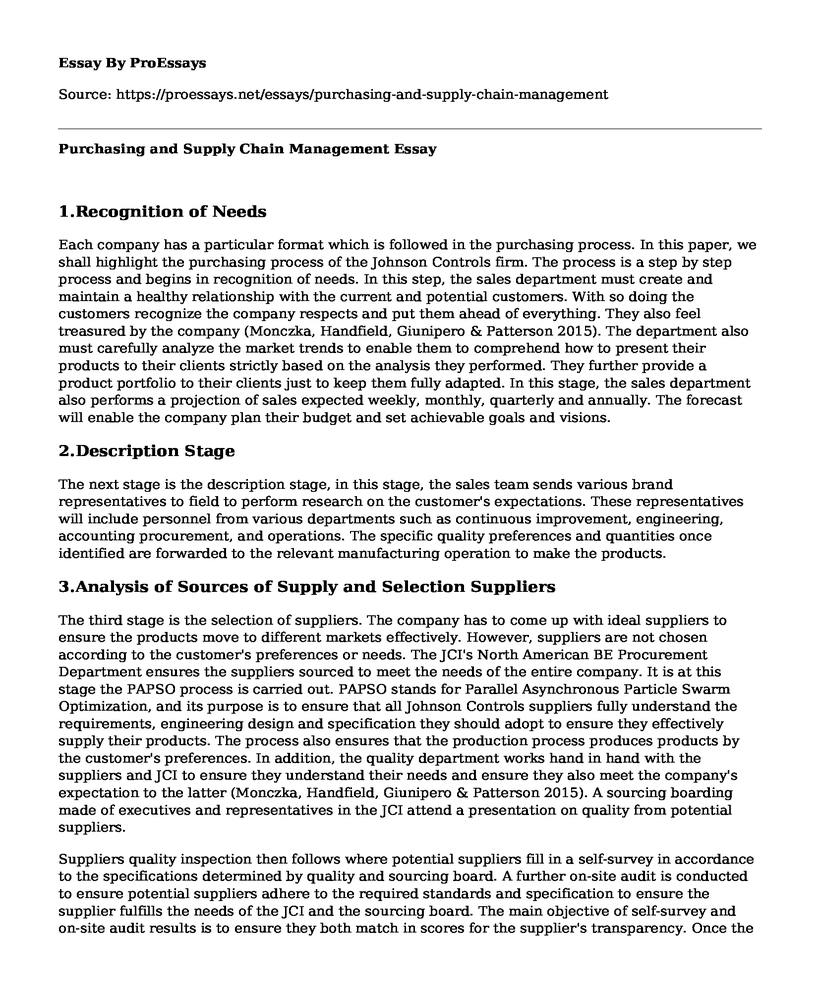1.Recognition of Needs
Each company has a particular format which is followed in the purchasing process. In this paper, we shall highlight the purchasing process of the Johnson Controls firm. The process is a step by step process and begins in recognition of needs. In this step, the sales department must create and maintain a healthy relationship with the current and potential customers. With so doing the customers recognize the company respects and put them ahead of everything. They also feel treasured by the company (Monczka, Handfield, Giunipero & Patterson 2015). The department also must carefully analyze the market trends to enable them to comprehend how to present their products to their clients strictly based on the analysis they performed. They further provide a product portfolio to their clients just to keep them fully adapted. In this stage, the sales department also performs a projection of sales expected weekly, monthly, quarterly and annually. The forecast will enable the company plan their budget and set achievable goals and visions.
2.Description Stage
The next stage is the description stage, in this stage, the sales team sends various brand representatives to field to perform research on the customer's expectations. These representatives will include personnel from various departments such as continuous improvement, engineering, accounting procurement, and operations. The specific quality preferences and quantities once identified are forwarded to the relevant manufacturing operation to make the products.
3.Analysis of Sources of Supply and Selection Suppliers
The third stage is the selection of suppliers. The company has to come up with ideal suppliers to ensure the products move to different markets effectively. However, suppliers are not chosen according to the customer's preferences or needs. The JCI's North American BE Procurement Department ensures the suppliers sourced to meet the needs of the entire company. It is at this stage the PAPSO process is carried out. PAPSO stands for Parallel Asynchronous Particle Swarm Optimization, and its purpose is to ensure that all Johnson Controls suppliers fully understand the requirements, engineering design and specification they should adopt to ensure they effectively supply their products. The process also ensures that the production process produces products by the customer's preferences. In addition, the quality department works hand in hand with the suppliers and JCI to ensure they understand their needs and ensure they also meet the company's expectation to the latter (Monczka, Handfield, Giunipero & Patterson 2015). A sourcing boarding made of executives and representatives in the JCI attend a presentation on quality from potential suppliers.
Suppliers quality inspection then follows where potential suppliers fill in a self-survey in accordance to the specifications determined by quality and sourcing board. A further on-site audit is conducted to ensure potential suppliers adhere to the required standards and specification to ensure the supplier fulfills the needs of the JCI and the sourcing board. The main objective of self-survey and on-site audit results is to ensure they both match in scores for the supplier's transparency. Once the results of both the self-survey and on-site audit results are presented to the sourcing board, they end up selecting the best supplier and leaving the rest out. The selected suppliers must fulfill needs as agreed per category (Monczka, Handfield, Giunipero & Patterson 2015). On the other hand, respective category managers have duties to perform tasks such as the RFIs, RFQs, and RFPs. The category managers are allowed to manage about 3-10 categories depending on the complexity of the categories and most importantly the experience of the manager.
4.Determination of Prices, Terms, and Conditions
The next step is the determination of price and terms of business. In this step, category managers negotiate update and set pricing of the point of sales to be created. The information is further sent to the suppliers by the operation personnel. Each category group has much bargaining power compared to the suppliers because of the amount of business JCI has. Preparation and placement of points of sale commence, and business is then ready to begin leaving a duty to make follow-ups on the terms of business.
5.Preparation and Placement of Purchase Orders
After prices are determined and point of sales located the final step is the preparation of purchase orders. The business is the set to begin; orders are delivered at the right time to avoid creating inconveniences. It is crucial to maintaining the organization image by delivering goods in the best state. Inventory is carefully checked and prepared according to the pre-audit requirements.
References
Monczka, R. M., Handfield, R. B., Giunipero, L. C., & Patterson, J. L. (2015). Purchasing and supply chain management. Cengage Learning.
Cite this page
Purchasing and Supply Chain Management. (2022, Apr 04). Retrieved from https://proessays.net/essays/purchasing-and-supply-chain-management
If you are the original author of this essay and no longer wish to have it published on the ProEssays website, please click below to request its removal:
- Products and Pricing Essay
- Parameters of Ethical Decision Making - Paper Example
- Culture of Safety Awareness: Why Safety Programs Fail Paper Example
- Essay on Codes of Conduct: Internal Guidelines and External Statements of Values
- Essay Example on Scrum: Simple Framework for High Quality Product Development
- Leaders Need to Articulate a Vision: 3 Reasons Why - Essay Sample
- Paper Sample on Ingredion Inc.: Supply Chain in Northern America







